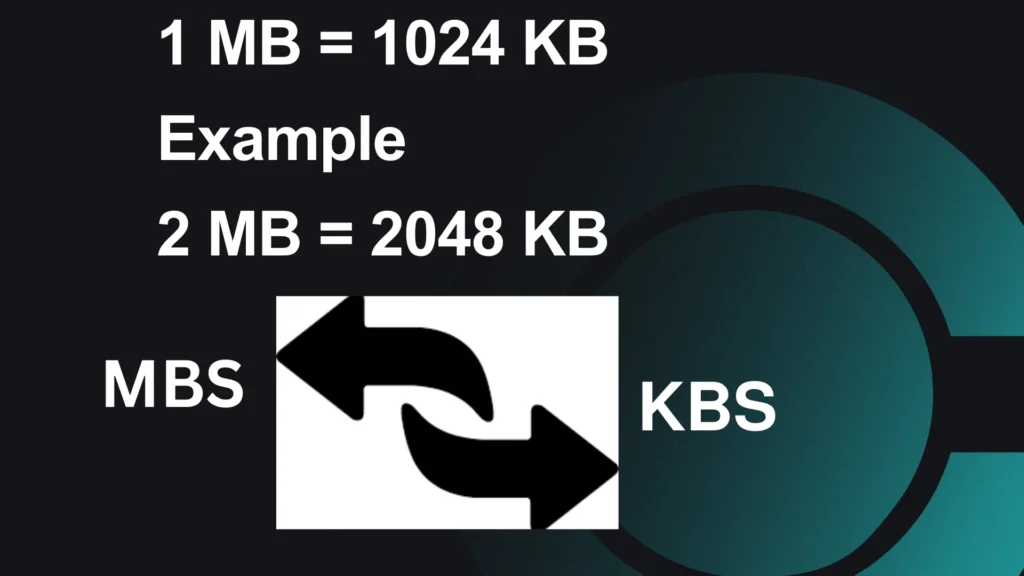Increasing the size measurement when handling digital files becomes confusing. Most websites accept files to be uploaded in kilobytes but yours are in megabytes. This discrepancy in size causes upload errors and wastage of time as well as storage management problems. You may end up with slow loading, and compatibility issues unless signed properly.
An MB to KB converter is also available to adjust files to a comfortable size so that they can be uploaded easily and be more compatible. It is the simplification of data management of emails, websites and cloud. A conversion becomes fast with a good tool or technique to do it without loss of file quality. This simplifies the management of files making it stress-free, easy, and quick.If you often work with spreadsheets or data reports, using our KB to MB Excel Converter makes it effortless to handle bulk file size conversions directly within Excel, saving time and ensuring accuracy for large datasets.

Table of Contents
What is MB?
MB abbreviation indicates the unit of digital storage, the size of which is 10 3 bytes, or 1,024 kilobytes (KB). It is mostly applied in the measurement of an intermediate sized data such as photos, songs and short videos.
What is KB?
KB means Kilobyte which is a smaller measurement of Digital Quantity, usually employed to represent less weighty records such as a text document, a programming icon, or web code. 1 KB = 1,000 Bytes (decimal) or 1,024 Bytes (binary).
How to Convert MB to KB
KB refers to Kilobyte which is a smaller way to measure Digital Quantity commonly used to denote records of the less weighted nature so it can refer to a text document, a programming icon, or Web Code. 1 KB = 1,000 Bytes (decimal) or 1,024 Bytes (binary).
KB = MB × 1,000 (decimal)
KB = MB × 1,024 (binary)
Example:
If you have a 5 MB file and use decimal conversion:
5 × 1,000 = 5,000 KB
If you are working with PDF files and need to increase their size for quality or compatibility reasons, checkout our Convert PDF from KBs to MBs guide for step-by-step instructions.
Uses of MB to KB Converter
1. Upload Compliances of File Size Uploads
Most web sites, email services and cloud services specify their file size with a limit in KB. An MB to KB converter plays an important role in making sure that your files are within these limits before you can upload them. This saves time since the files wont have to be re-uploaded time after time because of size discrepancies.
2. Space Management
Capacity of storage devices such as USB drives, SD cards and servers are frequently expressed in KB or MB. The units are easily converted back and forth to allow users to plan and manage spaces efficiently particularly when storing huge number of files.
3. Quick Data transfer Provisioning
When it comes to networking file size is related to upload and download time. The accurate size of the specific KB will enable you to extrapolate the speed of transfer and change the setting to eliminate overuse of bandwidth
4. Software and app MCM
The file sizes in KB are needed in the implementation of apps on software stores and platforms. Converters are utilized by developers so that the apps align to the platforms requirement and loads much quicker.
5. Search Engine Optimization and Web Optimization
One of the ranking factors is page speed. The conversion of MB to KB will help the webmaster monitor and minimise file size which results in a faster loading of websites and a better SERP listing.
Example: MB to KB Conversion
If you have a photo that is 2.5 MB, converting it to KB (decimal) will be:
2.5 × 1,000 = 2,500 KB
Now, you can upload it to a platform that requires a maximum file size of 2,500 KB or less.
Why Do We Convert MB to KB?
1. Accuracy in file Size Measurement
Certain applications and websites express or demand file dimensions in KB as opposed to MB. Converting provides precise tracking of size instead of rounding off matters that come when using MB values.
2. Interoperability with earlier Systems
Older software and legacy systems as well as some databases, measure it in KB. Conversion makes files read and processed without any compatibility problems.
3. Hitting Upload or Email Limits
The size limits of email attachments, web forms and upload systems tend to be quoted in KB. Using the conversion between MB and KB allows you to verify the compliance prior to sending the files or uploading.
4. Optimization using better control
With the KB size known, one can have better leverage over compressing and maintaining quality in optimizing media, websites or apps. This assists in escalating speed, reserving bandwidth and also in escalating user experience.
How It Helps in SEO and Different Platforms
1. Increased Loading speed of Websites
Smaller file sizes in KB also contribute towards reduced page load time, and this is a direct ranking factor to the search engines. More services are then available through faster websites, as it results in increased user experience and enhanced search engine optimization (SEO).
2. Better Mobile Optimisation
Connectivity of mobile users is usually weak. Internet optimization to KB will guarantee this to happen on smartphones as well as tablets thereby enhancing user engagement and lowering bounce rates.
3. CMS/Hosting Limits Compliance
CMS such as WordPress, or hosting platforms usually have maximum file upload limits expressed in KB. Changing MB into KB is beneficial in making content and media comply with such limits.
4. Improved Social Platforms Digital Experiences
Facebook, Instagram, and LinkedIn are social media sites that prefer optimized content. Optimization with the help of KB may result in faster uploading and a better quality of display, still, not overstep the boundaries.
Benefits of an MB to KB Converter
1. Space-Saving Storage
A conversion of files in MB to KB helps save more space on your devices or cloud drives since you will not have to expand your plans to store a large amount of information.
2. Enhances Up and Download Speed
These files with smaller sizes take shorter time to upload and download thus saving time as well as allowing the file to be shared across different platforms even in slow internet connections.Additionally, for situations where you need to increase file size measurements instead of reducing them, our KB to MB Converter provides a quick and accurate way to convert kilobytes back into megabytes, ensuring smooth file management in both directions.
3. Assists in Meeting File Size Limits
There are limitation to file sizes on many platforms, email services and CMS tools. An MB to KB converter will make your files compatible with these rules without sacrificing quality of the files.
4. Boosts SEO Performance
Optimizing images, PDFs, and videos to KB reduces page load time, improving search engine rankings and overall website performance.
5. Enhances Cross-Platform Compatibility
Files in KB are more likely to be compatible with older systems, mobile devices, and various online platforms, ensuring a wider reach for your content.
Pros and Cons of MB to KB Conversion
Pros:
- Easy file uploads.
- Faster transfer speeds.
- Better website performance.
Cons:
- Possible quality loss if compression is used.
- Requires accurate calculation to avoid errors.

FAQs
Q1: How many KB is 1 MB?
A: 1 MB = 1,000 KB (decimal) or 1,024 KB (binary).
Q2: Does converting MB to KB reduce file quality?
A: Conversion itself doesn’t reduce quality; compression might.
Q3: Is MB to KB conversion important for SEO?
A: Yes, smaller file sizes improve website load speed, boosting SEO.
Q4: Can I convert MB to KB manually?
A: Yes, using the formula KB = MB × 1,000 (decimal) or × 1,024 (binary).
Q5: Are online MB to KB converters accurate?
A: Yes, but choose trusted tools to avoid errors.
Q: How many KBs equal MBs?
A: Every MB contains either 1,000 KB (decimal) or 1,024 KB (binary), depending on the measurement standard.
Q: How do you convert MB to KB?
A: Multiply the number of MBs by 1,000 (decimal) or by 1,024 (binary) to get the size in KB.
Q: What is 1 KB equal to in MB?
A: 1 KB equals 0.001 MB in decimal or approximately 0.0009766 MB in binary.
Conclusion
The conversion of MB to KB is an easy but effective activity that can effectively reduce the work on storage administration, online work, and digital harmony. Regardless of whether you are a developer, a content creator or use files as a casual user, ensuring that the files are smaller does guarantee faster uploads, easier sharing and even improved search engine optimization. With an MB to KB converter you will save space, meet platform limitations, and greatly improve user experience without losing quality. In high-speed digital world nowadays, managing the file sizes is not an option, doing it should be a convenience, indeed.

One Response